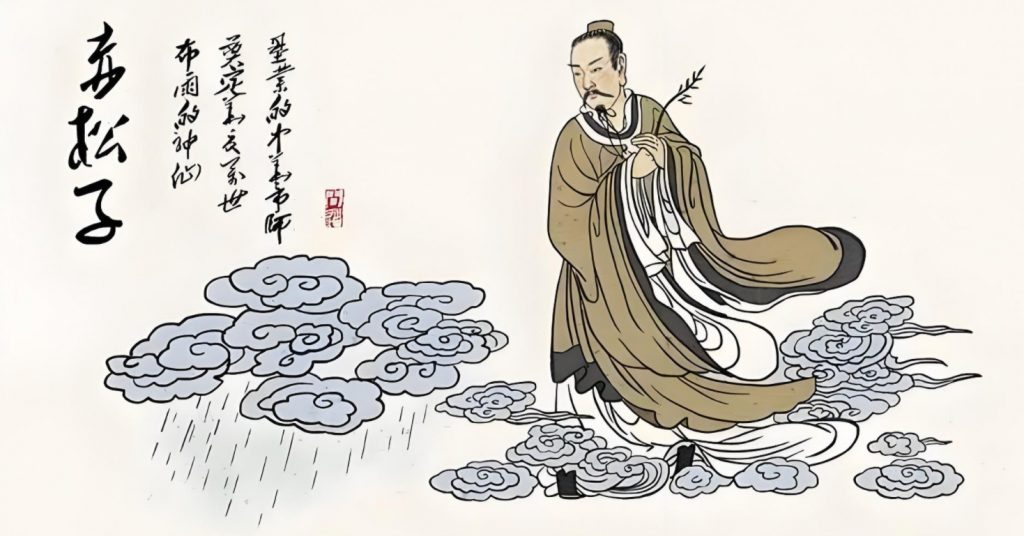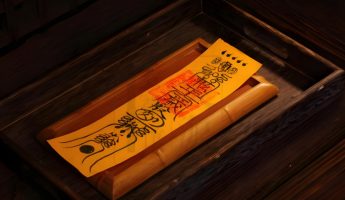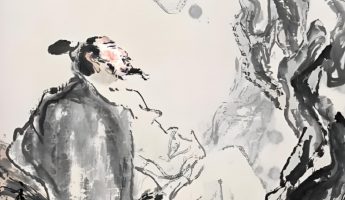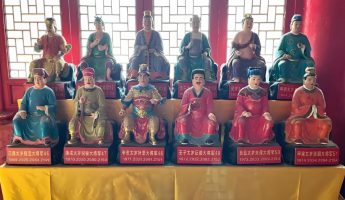In the vast immortal lineage of Taoism, Chisongzi stands out with his extraordinary and otherworldly image, and is known as the god in charge of wind and rain during the Shennong era, possessing the divine power of “chasing rain with the wind and soaring freely”. In the book “Huainanzi: Qi Customs”, it is described that he “absorbed the old and new, transcended form and bones, embraced simplicity and returned to truth, wandered in the mysterious realm, and ascended to the clouds and sky”, revealing the legendary journey of Chisongzi’s mountain cultivation in search of the path to eternal life. What he ultimately comprehended was the Taoist reverence for the techniques of guiding health preservation and refining elixirs, becoming a pioneering model for Taoist cultivation and immortality.
The story of Akamatsu is like a beacon, illuminating the path of spiritual liberation and life transcendence for future generations. The “Biography of Immortals” provides a detailed account of his immortal deeds, including consuming water jade, entering fire without burning, residing regularly in Kunlun, and accompanying the Queen Mother of the West. It demonstrates the possibility for Taoist practitioners to achieve the realm of transcendence and sainthood through unremitting efforts. This model has inspired countless literati, among whom the most acclaimed is Zhang Liang. After achieving success and fame, Zhang Liang chose to give up his glory and wealth, follow in the footsteps of the Red Pine Tree, practice the art of guidance, and ultimately retreat to the mountains and forests, practicing the highest realm of “wanting to travel from the Red Pine Tree”.

This choice not only reflects Zhang Liang’s indifference to worldly fame and fortune, but also reveals the profound pursuit of spiritual freedom and the essence of life by literati after experiencing the vicissitudes of life. From Chen Ziang’s “A lifetime of white clouds and aspirations, early love for the Red Pine Wandering” in the Tang Dynasty, to Xin Qiji’s “A cup of a thousand years old, asking what to do with the public, early companionship with the Red Pine Leisure”, and then to Zhang Wentao’s borrowing of ancient metaphors from the Qing Dynasty, the Red Pine has become a spiritual totem that transcends time and space, embodying the infinite yearning of literati for a transcendent and carefree life.
So, why do many Confucian scholars turn their attention to the ideals of Taoism after a bumpy career? The answer may be hidden in the legendary story of Chisongzi and the “Chisongzi Zhongjie Jing” he left behind. This classic is not only a code of conduct for practitioners, but also contains profound thoughts of promoting goodness, emphasizing the importance of doing good deeds and accumulating virtue, as well as its profound impact on personal cultivation and social harmony. In Taoist beliefs, immortals are all attained through the accumulation of good deeds. Therefore, following Chisongzi is essentially pursuing a philosophy of life that is based on goodness and involves both internal and external cultivation.
Although Confucianism and Taoism have their own emphasis between entering and leaving the world, they share similarities in pursuing the value of life and realizing personal ideals. Taoism regards “nature” and “non action” as the ways of governing the world and cultivating oneself, which not only achieved glorious times in history, but also provided a spiritual path of liberation for those literati who had been tempered in the officialdom. Akamatsu’s carefree ideal is not about escaping reality, but advocating a life attitude that transcends the constraints of fame and fortune, pursues inner peace and the essence of life.
In this sense, ‘wanting to travel from the Red Pine’ is not only an expression of personal cultivation goals, but also a profound reflection and repositioning of life values. It encourages people to find themselves in the chaotic world, persist in good deeds, and pursue spiritual freedom and sublimation. Regardless of the circumstances, maintaining the longing and pursuit for a better life is the precious spiritual wealth left by Akamatsu to future generations.



